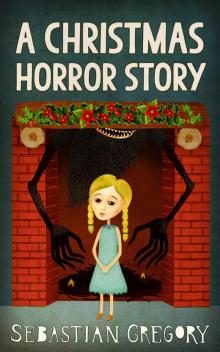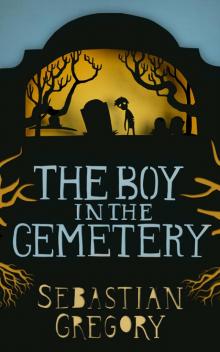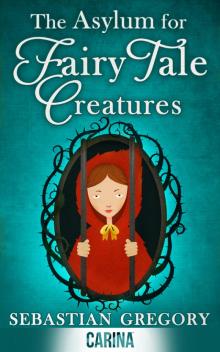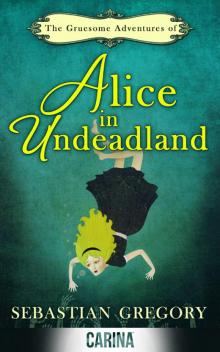- Home
- Sebastian Gregory
The Gruesome Adventures of Alice in Undeadland Page 2
The Gruesome Adventures of Alice in Undeadland Read online
Page 2
“What is Undeadland?” Alice asked.
When the mouse head spoke there was no movement, just a voice that suited the mouse well.
“This is Undeadland, where the unwanted dead go.”
“Can the dead be unwanted?” Alice wondered.
“Of course,” the mouse head explained. “Otherwise there wouldn’t be an Undeadland.”
This slightly annoyed Alice, being argued with a kind of logic that made no sense.
“You seem to know a lot for a bottle top.”
The mouse’s tone became less shrill and more sombre.
“Alas, I was not always so. Once I lived on a farm with many brothers and sisters, all running, nibbling and having fun as mice should. That was until the farm cat caught me unawares and made a present of my head to the farmer.”
“Oh,” Alice replied. “In that case I’m sorry to hear that. How did you come to be here?” she added.
“I spent a while longer on the shelf of the farmer’s wife stuffed in a bottle, watching the fat cat enjoy life, then one day the farmer tripped, knocking my bottle off the shelf. I landed right on that cat’s head, killing the monster instantly but shattering my bottle. The next thing I knew I was here.”
For the moment there was only quiet, save a grim wind blowing through the gravestones. The mouse coughed, murdering the silence.
“If you are not unwanted dead why are you here?”
“A white rabbit cut out and stole my heart. I followed it here.”
“Do you need your heart?”
“It is where I keep my love for my parents. It is the only thing I have left of them,” she explained further.
“I see,” replied the mouse head. “Perhaps I could help? I could be your guide and in return you could keep me safe? After all, I am a mouse bottle top without a bottle — we have both lost things.”
Alice thought for moment. The mouse head seemed pleasant enough and she had no clue to the rabbit’s whereabouts. The company would also not go unwanted.
“In that case,” she said, “I will keep you safe.”
“Oh, thank you. I won’t let you down, miss.” The mouse head was elated.
“Please, call me Alice.”
She fashioned a necklace from pieces of her dress with the mouse head as makeshift locket. She tied it around her neck. Into Undeadland she went, with Mousehead — the name she had chosen — as her companion. They walked amongst the gravestones, stopping occasionally to read the grim epitaphs from the many grim headstones.
Little Billy Brat swallowed a rat — it scratched through his throat, said one, and there in the stone was a carving of a boy cowering in fear, while a giant rodent slobbered above him.
Mary Mary dead and scary, said another and again in stone was a ghost child rising from a mirror held by a smaller little girl.
Victor Drake squeezed to death by a snake.
Henrietta Cripps impaled with sharpened sticks.
Little Bo Peep trampled by rabid sheep.
And so it went on. It reminded Alice of a story the children of the orphanage would tell each other. It was a way of finding comfort in the pain of others. She spoke it out to Mousehead.
“‘Ten Victorian children playing amongst a long-lost shrine,
One disturbs the cursed seal,
Then they are nine.
Nine Victorian children bind a friend with weight,
They throw him into the murky pond,
Then they are eight.
Eight Victorian children pray to their two friends in heaven,
Down peels a lightning bolt,
Then they are seven.
Seven Victorian children doing magic tricks,
One summons a malevolent demon,
Then they are six.
Six Victorian children burying each alive,
One falls fast asleep in the dark,
Then they are five.
Five Victorian children answer a midnight rapping at the door,
One is sent insane by a raven
Then they are four evermore.
Four Victorian children climbing a haunted tree,
Arises the headless horseman,
Then they are three.
Three Victorian children poking victims of black flu,
Red rings blistered on the skin,
Then they are two.
Two Victorian Children steal a toy monkey banging a drum,
The monkey grants three evil wishes,
Then there is one.
One lost Victorian child lamenting under the moon,
Wandering lonely into the mist,
Joining dead friends soon.’”
Now Alice wasn’t sure if it was the strangeness of the place, but she couldn’t help the feeling she and Mousehead were not alone. She crept slower, looking this way and that as shadows seemed to move over the never-ending gravestones, washing over them like a dark tide. Alice quickly turned as if to catch any stalker unawares and glimpsed shapes in the dark, quickly peeping and ducking behind the gravestones. This was followed by a muted giggle and a shift in the grave dirt, as if something unpleasant was waking below.
“Mousehead,” she whispered, “can you hear that?”
Further into darkness Alice went, peering.
With each step grew an uneasy feeling.
Following.
Creeping.
Behind her.
Breathing.
“Mousehead,” said Alice, “I don’t think we are alone.”
“Here we never are,” Mousehead replied.
The giggling became louder. The shadows had shape. Alice instantly recognised the dark outlines of children and they moved in and out of the gravestones playing a ghostly hide and seek. Alice went to move faster but shadow children rose from the tombs in front, blocking any escape. The whispers were coming from all around. Alice spun to find a way out, only to find herself trapped by the ever-growing shadows.
“Stay out. Don’t let them touch you,” Mousehead pleaded.
“How can shadows harm me?” Alice desperately needed to know.
“How can shadows not? If they touch you then you will join them — we will join them.”
The whispers became fully audible words:
Time to play, time to play,
Stay all the night,
Never go away.
There were eyes, blinking eyes, flowing within the shadows, pure white and horrible.
“Now,” said Alice, “let’s settle down. I have to be on my way.”
The shadows were inches from her feet and Alice stood on tiptoe like a child avoiding waves on the shore. Just as Alice was about to lose herself, there was a sudden commotion.
“Get back in there,” something shouted, waving a fiery torch. The heat singed past Alice as she fell backwards, landing with a bump.
“Get back, you buggers.”
The shadow children retreated back into their graves; they flowed in reverse. Alice was left with the bizarrest set of twins she had ever laid her eyes on, towering above her.
“Well?” said one.
“Off you go, back into the grave with you,” added the other.
Both were large, bordering on huge. Both wore striped suits not unlike criminals committed to an asylum for the insane. Both were, at first glance, exactly the same. However as Alice took a closer look she realised they were merely almost the same. Both had the same beady dark eyes fixed deep into small heads that looked as if they could roll off their rotund bodies at any moment. Yet one of the twins wore around his neck a large hangman’s noose. The other had the handle of knives and the odd cleaver stuck firmly along his back. On each of their massive right hands was a tattoo scrawled in blue ink. The tattoos read Tweedleglum and Tweedlegloom.
Chapter Five
“Why are you not getting back in your grave?” a Tweedle bellowed. The flames were waved an inch from Alice’s skin, which hissed.
“Do you mind?” snapped Alice. “That is very hot and dangero
us.”
Tweedleglum looked at Tweedlegloom, or maybe Tweedlegloom looked at Tweedleglum.
“Hot? Hot? Hot?” the one with the torch and noose wanted to know.
“Shadows don’t feel. Shadows don’t like the light,” the other added. Their voices sounded exactly like tombstones crumbled and weathered with age. Alice got to her feet; the Tweedles were still more than twice her size.
“I am not a shadow. I am...” Alice corrected herself. “I was a girl.”
The closer Tweedle’s mouth opened and slowly closed again in disbelief. A cockroach ran from his dried lips to freedom. The pair burst into deep, guttural laughter.
“Leave her alone, you lumps,” Mousehead squeaked. Before Alice had the chance to protect the tiny, brave and foolish thing, the Tweedles stopped their laughter. The one with the noose that the tattoo identified as Tweedlegloom lurched forward and snatched the mouse from Alice’s neck. Alice jumped after her companion but was held back by Tweedleglum’s huge fist.
“Please don’t hurt him,” begged Alice.
Tweedlegloom sneered and held the mouse-head necklace dangling above his mouth chasm. Mousehead squeaked for a final time before Gloom let it go and swallowed the poor creature whole.
“Delicious,” he bellowed; the other Tweedle joined in with the laughter.
“Monsters,” Alice screamed, pulling to no avail at her captor’s grip.
Alice’s protest caused more laughter again and again, until a screeching sound pierced from beyond the gravestone garden. Immediately the two fell silent. Alice noted how they seemed to shrink into themselves and something resembling fear fell upon their cruel faces.
The sound came again, a screech, a caw of a raven perhaps? Gloom put his hand across Alice’s mouth and held her fast. “Shush,” he whispered.
Jabberwocky, the sound was coming closer.
“It’s near, it must have heard us,” Tweedleglum said as meek as something his size could.
“Why is it so far from the Rigor Mortis Forest?” Gloom asked.
“I think it’s hungry. We have to go. Let’s take this one to the undertaker and he’ll know what to do.”
A huge hand covered Alice’s head and for a moment the world disappeared.
Chapter Six
Alice heard a merry tune:
It comes as no surprise,
The dead regard the living through hollow and envious eyes.
Passed loved ones sever all emotional ties,
So have no tears to dry,
For the dead regard the living through hollow and envious eyes.
And the song drifted away and her mother spoke:
“Open your eyes — time to join the land of the dead.”
Alice was greeted again by the monochrome world of Undeadland. She tried to turn her head, but was unable. She found herself equally restricted when testing her limbs. Alice noted from the corner of her eye that she was bound to a strong wooden chair. She pulled to free her arms but leather binds cut into her flesh; there was a wet tearing sound like damp cloth ripping. She had been placed at the head of a long oblong table. It was covered in a sickly green sheet and upon that a countless amount of medicine bottles. Alice could see some of the labels. They read: formaldehyde, methanol, glutaraldehyde and phenol, each sounding as horrid as the others. Whips of smoke formed an evil cloud of steam above the bottles that resembled a ghostly skull.
However, the sight was not as disturbing as the other “guests” to the left and right of Alice. To her left: a suited gentleman, bound to his chair like Alice. Unlike Alice the gentleman had the head of a March hare. Its brown fur was thread bear and like a worn carpet. Its eyes were buttons sewn into place. A pair of ears were bent awkwardly from its head. To Alice’s right: a human-sized pot doll girl. She wore a sweet pink dress with bows and lace and flowered patterns. She had a porcelain face with painted eyes, hair and grin, her surface a criss-cross of tiny cracks. The pair turned to Alice, shaking their heads and rocking. The pair were also tied firmly to their seats.
“Oh, settle down, you two,” a voice from the end of the table said. “Honestly, it’s as if you don’t like being here.” The words dripped as if from a grin grinning grimly.
It coughed expectantly and from the edge of Alice’s vision a Tweedle thumped to the end of the table. The behemoth reached down and placed a man, the size of a toddling child, amongst the bottles of nastiness. The tiny man wore the black suit and top hat of an undertaker. Alice recognised such from her parents’ own funeral. Even with the top hat the undertaker was no taller than three feet. He looked ridiculous in his size, yet Alice knew evil things, like poison, came in small packages.
He danced towards Alice, skipping around and over the bottles, tipping his hat, and gave a bow.
“Hello, my dear,” he said through yellow teeth the colour of embalming fluid. “The Tweedles here tell me you came through the shadow graves. They tell me you say you don’t belong — why is that?”
“I don’t belong anywhere, I suppose.”
“Hmm, curious,” the undertaker replied. “Enlighten me, dear, where do you belong?” As he asked the question the tiny undertaker had begun picking and pouring the contents of each of the bottles. A faint hiss escaped from the mixture.
“I’m not sure,” she forlornly said. “I escaped the pain of the orphanage and found myself here. I realise now, there is no escape from pain. It was waiting for me.”
The undertaker, the hare and the pot-doll prisoner stared in stunned silence. Then suddenly all three burst into insane laughter.
Then pot-doll girl had a wincey, high-pitched fit of tee-hees through broken glass. The hareman gave a dusty, muffled dry cough, a choking ha ha. The worse, by far, was the mad undertaker himself with his small chuckles suggesting dark intention. He danced with his mixture and sang:
“Decaying, flaying little corpse,
How I wonder how you rot,
Far below the earth so deep,
Letting worms fester in your meat.”
The undertaker the mixture and in one movement gripped the hareman mouth opened wide, pouring the oozing liquid into the dry throat.. Shaking, the Hareman went into a spasm, choking on the smoke that rose from him. It engulfed his eyes and ears, choking his entire head. The pot-doll girl screamed, trying to shake herself free. The undertaker forced the bottle of stuff over the pot-doll girl’s mouth, yet as she had no human mouth the horrid black stuff poured down her smooth chin and over her dress. The effect was the same, as both prisoners shook. Alice tried to rear away as the smoke gained form and became two shadows identical to the inhabitants of the graveyard garden. They swirled for a moment before floating away giggling as if sailing on an invisible sea. The bodies of the two were now shrunken and empty; their heads flopped uselessly on their chests.
“We are born children, we die children,” the mad undertaker said, drool hanging from his thin lips.
He picked up more bottles and began mixing. The Tweedles looked on with horrendous glee as the undertaker danced and tapped towards Alice.
“Wait,” she said.
“For what, my dear?” The undertaker hopped excitedly from one foot to another.
“ JABERWAAAAAAK,” Alice cawed.
The undertaker, puzzled, stood aghast. The Tweedles, confused, slowly stood by the undertaker’s side.
“JABERWAAAAAAK.”
“What are you doing?” asked Tweedleglum.
“Sanity has abandoned her,” Tweedlegloom noted.
“Stop her,” the undertaker whispered.
“JABERWAAAAAAAK.”
“Stop her,” the undertaker shouted at the top of his voice.
“JABERWAAAAAK,” came a squawk that rattled all their bones. It was not Alice, however.
“You pair of fools,” sobbed the undertaker. “She’s called it here.”
There was a gust of air that blew Alice backwards and obliterated the tables. Amongst the splinters and glass, the undertaker was snapped into the air and
disappeared down a gullet. Alice lay in the debris. A Tweedle ran for cover before a whoosh quartered him. The other crawled and pleaded to no avail as the creature landed over him and peck-pecked him to rags.
The turmoil began to settle and dirt lazily fell to the ground like filthy snow. The beast regarded Alice, tilting its head this way and that, its black eyes blinking and reflecting Alice back at herself. It resembled a raven to a degree, almost like the ones Alice had seen in London more times than she remembered, except this raven was at least twenty feet tall. At one time it would have had shiny black feathers, but now they were few and far between with bald spots of dry blistering skin patches covering its body, where the creature’s wings were mostly bone and scraggy.
“JABBERWARK,” it squawked from its blade-sharp beak.
Alice raised a hand and stroked the beast on the closest wing.
“Thank you.” Alice spoke softly.
And with that the raven thing reared and, with a great cough, regurgitated something at Alice’s feet. Then in a gust of wing, the creature was away into the dark sky. Alice looked down to see a Tweedle’s hand and forearm floundering like a dying fish. Next to it lay the Mousehead bottle-top necklace.
“Hello, Alice,” it chirped.
Chapter Seven
Mousehead told its tale…
“I was swallowed and lost, scared and alone,
So near, yet so far from my undead home,
Down dry tubes and into the stomach I go,
When on the shore of stomach acid,
I spotted the head of the extinct dodo.
‘Hello,’ said the bird all eaten and rotten,
Doomed for ever to be forgotten,
As I replied, I started to cry,
Missing my Alice, who was once alive but then did die,
The dodo listened intently and pittied my story,
With glee it said it had seen the rabbit in a hurry,
Before the Tweedle ate the dodo just for fun,
The dodo spied the rabbit towards forest on the run.”
Alice picked up Mousehead and blew the “bits” from it. Before she positioned it around her neck, she gave it a little kiss.

 A Christmas Horror Story
A Christmas Horror Story The Boy in the Cemetery
The Boy in the Cemetery The Asylum for Fairy-Tale Creatures
The Asylum for Fairy-Tale Creatures The Gruesome Adventures of Alice in Undeadland
The Gruesome Adventures of Alice in Undeadland